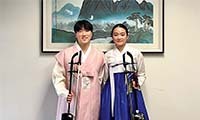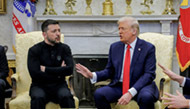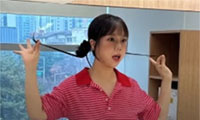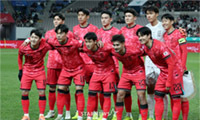BEIJING - After years spent building spectacular, state-of-the art opera houses around the country, China is experiencing a boom in Western-style grand opera.
“Opera development is like a miniature of the country,” said Chen Zuohuang, music director of the National Center for the Performing Arts here. “Too fast and very ambitious.” The past year alone brought the establishment of an Academy of Opera at Beijing University; the second annual National Center Opera Festival, with 12 different operas performed in 10 weeks; the premiere of Wagner’s “Ring” Cycle in Shanghai; and the grand opening of the $202 million Guangzhou Center for the Performing Arts, designed by the Iraqi-born Zaha Hadid.
In addition, three operas were performed in just one week at the Beijing Music Festival; and a Sino-European Summit for the Performing Arts was held in Beijing that included directors of major European institutions like the Barbican (London), the Theatre du Chatelet (Paris) and Deutsche Oper Berlin.
A comic-opera festival mounted by the Beijing impresario Li Wei, who has said that he wants “to make Western opera a common art” in China, began just before Christmas, and the national center honored the holiday with a “World Classic Opera Gala,” to be followed by its production of Verdi’s “Traviata” and Hao Weiya’s “Village Teacher.”
Most of the operas are from the standard romantic repertory, sung in the original languages, often as co-productions with overseas opera houses. Increasingly, however, the productions are created in China and the stories adapted to Chinese settings.
More imaginative adaptations are also under way, like Zhang Huan’s version of the Baroque opera “Semele” by Handel, which was set in a 450-year-old Chinese ancestral temple and included Mongolian long singing, a Tibetan funeral song and some racy scenes involving monks.
“Anybody could direct Handel, but only I could do this,” Mr. Zhang said.
The focus is on building a corpus of modern opera that will find audiences both at home and abroad.
In China there are added complexities for the creators, language chief among them.
Spoken Chinese is tonal, with the meaning of a word dependent on its pitch.
Composers must nonetheless strive to make the melodic line reflect the tone of each word, or audiences may laugh.
Another linguistic challenge is the dearth of non-Chinese opera singers able to sing in Chinese.
Politics is also a complicating factor, with certain government officials able to demand cuts and alterations at will, but some artists argue that the censorship problem is improving.
Ultimately, China may become an operatic force.
“They are all looking to China for the survival - the only hope for growth - for all classical music, frankly,” said Shirley Young, chairwoman of the US-China Cultural Institute. “The future of classical music is here.”
By SHEILA MELVIN
스마터리빙
more [ 건강]
[ 건강]이제 혈관 건강도 챙기자!
[현대해운]우리 눈에 보이지 않기 때문에 혈관 건강을 챙기는 것은 결코 쉽지 않은데요. 여러분은 혈관 건강을 유지하기 위해 어떤 노력을 하시나요?
 [ 건강]
[ 건강]내 몸이 건강해지는 과일궁합
 [ 라이프]
[ 라이프]벌레야 물럿거라! 천연 해충제 만들기
 [ 건강]
[ 건강]혈압 낮추는데 좋은 식품
[현대해운]혈관 건강은 주로 노화가 진행되면서 지켜야 할 문제라고 인식되어 왔습니다. 최근 생활 패턴과 식생활의 변화로 혈관의 노화 진행이 빨라지고
사람·사람들
more많이 본 기사
- 트럼프, 李대통령에 ‘백악관 황금열쇠’ 선물… “최고의 협력관계”
- 산타 한반도 다녀가셨네…성탄절 밤하늘 제주-서울 돌고 평양행
- 北 “신형장거리대공미사일 동해상 시험발사”…김정은 참관
- 조지아 역주행 사고, 한인 남편 이어 임신 아내·태아 사망
- 국방부 “中, 美 안보 위협할 군사력 보유…본토 갈수록 취약”
- 로비 단서 혹은 과대포장?…3천쪽 통일교 내부문건 살펴보니
- 성탄 전날 LA 일대 폭풍우…돌발 홍수·산사태 경보
- [‘로드 레이지’ 한인 피살 현장 상세 상황] 끼어들기 시비가 비극으로… 차에서 내려 “쏴봐라” 언쟁
- ‘16kg 감량’ 홍현희, 다이어트 비결 뭐길래..날렵해진 턱 라인
- 경찰, ‘마약혐의’ 황하나 영장신청 예정…도피 중 범행도 수사
- “트럼프특사, 벨라루스 정상과의 협상수단으로 살빼는약 동원”
- 한인 박찬영씨 총격살해범은 백인 군인...살해범 “박씨 차량이 끼어들어 시비가 붙어 결국 총쐈다”
- 테슬라 ‘비상시 차문 안열리는’ 문제… 1
- 김정은, 8천700t급 핵잠 건조 지도… “韓핵잠, 반드시 대응할 위협”
- 기부 줄이는 미국인들…트럼프·고물가·탈종교 3중 한파
- 엔비디아, ‘추론 강화 AI칩’ 스타트업과 기술 라이선스 계약
- 경찰, ‘통일교 로비 키맨’ UPF 前회장 13시간 피의자 조사
- 팀 쿡 애플 CEO, 나이키 주식 43억원어치 매입…나이키 주가↑
- [성탄절 문 여는 곳은] 코스코·월마트 닫고… CVS는 영업
- 법무부 “엡스타인 자료 100만건 추가돼…공개에 수주 소요”
- “청소년 성별확정치료 중단 안돼”…19개주, 정부 상대 소송
- 뉴욕증시, 성탄절 앞두고 상승 마감…S&P500 연일 사상최고치
- 온라인쇼핑과 반품, 그리고 그 이후 1
- 시택공항서 “내 이름이 뭔가요” 캠페인...가짜 차량공유 범죄 예방 위해 캠페인 시행키로
- [이민 단속] 여권 소지 시민권자들 … 2
- 박나래, 과거 또 파묘..이번엔 ‘나혼산’ 18L 식용유 장면
- 美당국자 “백악관, 우선은 제재통한 베네수 경제압박에 초점”
- 워싱턴주 시애틀산악회 유철웅 회장 연임...2015ㆍ2016ㆍ2025년에 이어 4번째 회장직 맡기로
- 브라운대 총격범, 대학원 중퇴후 고립된 삶… “유령같은 존재”
- 구은희 한국어교육재단 이사장 이천시 담당 부회장으로 임명
- 美, 물류거점창고에 불체자 8만명 수용 추진… ‘아마존택배’ 방식
- 오레곤 한국전쟁기념재단 새 이사장에 박성민씨...새 부이사장에 김성윤씨…회장 및 사무총장은 유임키로
- 시애틀지역 사상최대 마약 적발...킹카운티 셰리프국, 메스암페타민 214파운드 압수
- ‘소득세’없었던 워싱턴주에 소득세?...밥 퍼거슨 워싱턴주지사, ‘백만장자 소득세’ 공개 지지
- 한국외대, ‘김재한 강의실’ 헌정식
- [이민 단속] 새해에도 더 공격적 단속
- 함소원, 진화와 한 지붕 이혼 부부..결국 눈물 “헤어지는 게 힘들어”
- 두 손 모아 성탄기도… “온 세상에 평화를”
- 대통령 상징 ‘봉황기’ 29일 0시 용산서 내리고 청와대에 걸린다
- 지평 넓히는 K-푸드… 라면·김치 이어 과자·스낵 가세
- ‘박지윤과 이혼’ 최동석, 두 자녀와 데이트.. “기적 같은 일”
- 뉴욕시 전철 2인1조 운행 물건너 가
- 트럼프의 새 독트린 “미국을 다시 왜소하게”
- 트럼프 행정부, H-1B비자 추첨 내년 2월 폐지…고임금 인력 우대
- 이대우 뉴저지한인회장, “적자 개인적으로 전액변제”
- ‘파워볼’ 열풍 계속… 오늘 잭팟상금 17억 달러
- [미국은 지금] MAGA의 분열, 예… 1
- [부 고] 박종군 전 뉴욕청과협회장 별세
- 먹는 비만약 경쟁 치열 ‘위고비’ 미국 판매승인
- ‘이정후 위엄’ SF CEO+사장+단장+감독→韓 총출동! 황재균·윌리 아다메스까지 선행 참여
1/5지식톡

-
 미 육군 사관학교 West Poin…
0
미 육군 사관학교 West Poin…
0https://youtu.be/SxD8cEhNV6Q연락처:wpkapca@gmail.comJohn Choi: 714-716-6414West Point 합격증을 받으셨나요?미 육군사관학교 West Point 학부모 모…
-
 ☝️해외에서도 가능한 한국어 선생님…
0
☝️해외에서도 가능한 한국어 선생님…
0이 영상 하나면 충분합니다!♥️상담신청문의♥️☝️ 문의 폭주로 '선착순 상담'만 진행합니다.☎️ : 02-6213-9094✨카카오톡ID : @GOODEDU77 (@골뱅이 꼭 붙여주셔야합니다…
-
 테슬라 자동차 시트커버 장착
0
테슬라 자동차 시트커버 장착
0테슬라 시트커버, 사놓고 아직 못 씌우셨죠?장착이 생각보다 쉽지 않습니다.20년 경력 전문가에게 맡기세요 — 깔끔하고 딱 맞게 장착해드립니다!장착비용:앞좌석: $40뒷좌석: $60앞·뒷좌석 …
-
 식당용 부탄가스
0
식당용 부탄가스
0식당용 부탄가스 홀세일 합니다 로스앤젤레스 다운타운 픽업 가능 안녕 하세요?강아지 & 고양이 모든 애완동물 / 반려동물 식품 & 모든 애완동물/반려동물 관련 제품들 전문적으로 홀세일/취급하는 회사 입니다 100% …
-
 ACSL 국제 컴퓨터 과학 대회, …
0
ACSL 국제 컴퓨터 과학 대회, …
0웹사이트 : www.eduspot.co.kr 카카오톡 상담하기 : https://pf.kakao.com/_BEQWxb블로그 : https://blog.naver.com/eduspotmain안녕하세요, 에듀스팟입니다…
케이타운 1번가
오피니언
 정숙희 논설위원
정숙희 논설위원온라인쇼핑과 반품, 그리고 그 이후
 파리드 자카리아 / 워싱턴포스트 칼럼니스트 / CNN ‘GPS’ 호스트
파리드 자카리아 / 워싱턴포스트 칼럼니스트 / CNN ‘GPS’ 호스트 트럼프의 새 독트린 “미국을 다시 왜소하게”
 김동찬 시민참여센터 대표
김동찬 시민참여센터 대표 [미국은 지금] MAGA의 분열, 예견된 균열의 시작
 임지영 (주)즐거운 예감 한점 갤러리 대표
임지영 (주)즐거운 예감 한점 갤러리 대표 [수요 에세이] 삶이라는 배를 타고
 이영창 / 한국일보 기자
이영창 / 한국일보 기자[지평선] ‘인간GPT’ 환각의 부작용
 조환동 / 편집기획국장·경제부장
조환동 / 편집기획국장·경제부장 AI로 가속화되는 노동시장 개편
 민경훈 논설위원
민경훈 논설위원‘크리스마스 캐롤’과 산타 클로스
 정재민 KAIST 문술미래전략 대학원 교수
정재민 KAIST 문술미래전략 대학원 교수 [정재민의 미디어풍경] 적과의 동침, 협력하며 경쟁하기
 김영화 수필가
김영화 수필가 [화요칼럼] 단호박의 온기
1/3지사별 뉴스

“온 세상에 평화를⋯”
숨가쁘게 달려온 2025년을 이제 1주일 남짓 남긴 채 크리스마스 이브를 맞는다. 다사다난했던 한 해를 되돌아보며 마무리하는 연말 시즌과 크리…
H-1B비자 고임금·경력자에 우선권

‘올해는 ICE 이민자 체포 광풍의 해’
올 한해동안 버지니아와 메릴랜드, DC 등에서 연방 이민당국에 체포된 사람이 1만명이 훌쩍 넘는 것으로 조사됐다. 또 미 전국적으로는 22만명…
“ATM기 사용하기 겁나네”

연말 ‘로드레이지’ 비극… 한인 총격 피살
연말을 맞아 도로 위에서 순간적으로 벌어진 운전 중 시비가 40대 한인 가장의 총격 피살 비극으로 이어졌다. 워싱턴주 레이시 경찰국과 서스턴 …
[‘로드 레이지’ 한인 피살 현장 상세 상황] 끼어들기 시비가 비극으로… 차에서 내려 “쏴봐라” 언쟁

오늘 하루 이 창 열지 않음 닫기 





















































.png)


댓글 안에 당신의 성숙함도 담아 주세요.
'오늘의 한마디'는 기사에 대하여 자신의 생각을 말하고 남의 생각을 들으며 서로 다양한 의견을 나누는 공간입니다. 그러나 간혹 불건전한 내용을 올리시는 분들이 계셔서 건전한 인터넷문화 정착을 위해 아래와 같은 운영원칙을 적용합니다.
자체 모니터링을 통해 아래에 해당하는 내용이 포함된 댓글이 발견되면 예고없이 삭제 조치를 하겠습니다.
불건전한 댓글을 올리거나, 이름에 비속어 및 상대방의 불쾌감을 주는 단어를 사용, 유명인 또는 특정 일반인을 사칭하는 경우 이용에 대한 차단 제재를 받을 수 있습니다. 차단될 경우, 일주일간 댓글을 달수 없게 됩니다.
명예훼손, 개인정보 유출, 욕설 등 법률에 위반되는 댓글은 관계 법령에 의거 민형사상 처벌을 받을 수 있으니 이용에 주의를 부탁드립니다.
Close
x